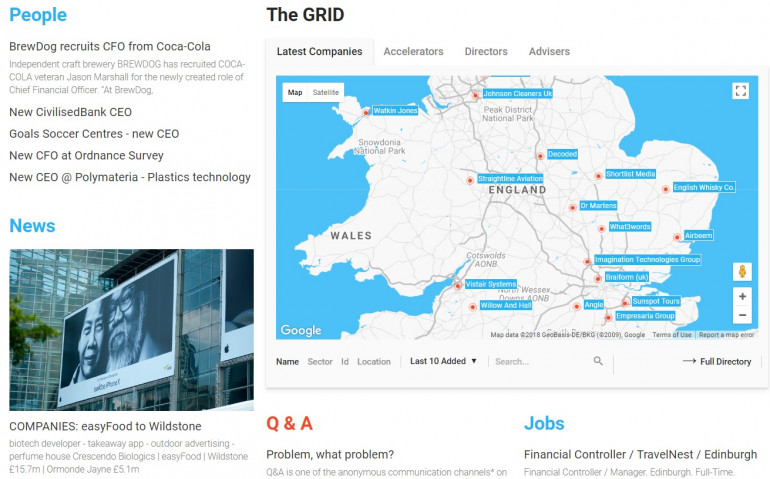Published by Directorzone Markets Ltd on October 3, 2016, 9:00 am in Knowledge, Market Info
Wednesday January 1st 2020
IMAGE: Courtesy of Ged Carroll – Money
Digest of news and trends in the GRID marketplace in September 2016:
Care deficit economics | Tech funding | Start-up stats | Facebook of Everything | Tech startup exits - UK #2 | Big Society | Private Capital Markets
CARE DEFICIT ECONOMICS
Meet the Pikes: The brothers who gave up corporate jobs and first-home deposits to launch SuperCarers | Harriet Green, City A.M. September 25
There are currently 1.9m elderly people in the UK who have a care need; under half of them have support. That figure will rise to 4m by 2025 and, in the meantime, we’ll see a carer deficit of 600,000. Most councils will only fund care in cases of substantial or critical need, “which means most people are basically screwed. If you’re lucky enough to get support and have a financial assessment, if you have over £23,250 of assets, you’ll pay for your own care. That means there’s a large number of people in this country who are not wealthy and whose assets and savings are decimated by the cost of care. And we don’t talk about it,” Adam Pike, SuperCarers says.
TECH FUNDING
Cash-hungry start-ups need more than one capital city | Kiki Loizou, The Sunday Times. September 25.
Last year, the promotional agency London & Partners found that 75% of money raised by the country’s tech sector was pumped into fledgling businesses in the capital. To help bridge the gap, the government’s BRITISH BUSINESS BANK is set to launch a £250m investment company with the help of well-known fund managers, such as Neil Woodford. The new venture will focus on backing early-stage technology companies outside the M25, and should be up and running by the end of the year. Those close to the new fund suggest that young businesses will benefit from payments of between £5m and £10m and could receive office space and mentoring with the cash.
James Bedford, head of investment strategy at TECH NORTH, the government’s agency ...claimed the lack of funding options available has caused some promising young firms to wind down as well-funded competitors born in London and overseas take the lead. “They either pack it all up, and it can be a slow and painful death, or they become very customer focused, which sounds good, but means they grow too slowly.”
When it comes to start-up funding ….SCOTTISH EQUITY PARTNERS, the BUSINESS GROWTH FUND and the £100m ANGEL COFUND are among active investors outside the capital. There are also the so-called Jeremie funds, which provide a mixture of equity and debt finance to small and medium-sized businesses. These include the £120m NORTH EAST FUND and the £400m NORTHERN POWERHOUSE SCHEME. About half the cash available comes from the European Union and the rest from the European Investment Bank. Last month, chancellor Philip Hammond guaranteed that the government would step in to back the funds if the EU withdrew its cash because of Britain’s Brexit vote.
The lack of a well-developed community of investors outside London has prompted many businesses to seek funding overseas. “I think when you’re wanting to go global, you need to look to firms outside the UK to help. It’s not just about the money it’s much more about how much value the investor can add,” said Chris Blaxall, PERFORMANCE HORIZON. “We look for investors that can open doors to prospective customers,” he said.
EU funds for 600 startups have been unfrozen after Brexit pause | Lynsey Barber, City A.M. September 26
Cash from the EU Regional Development Fund was paused by the Treasury almost immediately following the vote for Brexit putting at risk a shot in the arm for the country's tech startups worth nearly £4m. The funding, part of the £7.4m Capital Accelerate and Scale Tech Startup (CASTS) scheme administered by CAPITAL ENTERPRISE, will now go ahead and will launch in the next fortnight.
John Spindler, chief executive of Capital Enterprise, explained: "… on 6 October this project will kick off with a mission to provide advice and direct assistance to over 600 tech start-ups in London so they can achieve critical milestones, raise over £50m in additional investment and create over 400 jobs."
The EU RREGIONAL DEVELOPMENT FUND provides billions of pounds worth of funding to the UK for various projects and chancellor Philip Hammond had promised to guarantee funding for some projects in the wake of concerns. …the government has now signed off on the startup funding ....which will go towards:
- creating four to five new tech accelerators,
- deploying corporate and investment experts across some of the top accelerators such as Startup Bootcamp, Seedcamp and Tech Stars to help startups become so-called scale-ups
- creating an artificial intelligence lab with University College London (UCL) to offer world leading expertise
START-UP STATS
Startups are swelling the ranks of UK businesses | Billy Bambrough, City A.M. September 26
The number of VAT registered businesses in the UK has hit an all-time high of 2.1m, up four per cent from 2m last year.
The rise has been driven by the thriving national startup economy, according to accountancy group UHY HACKER YOUNG. The number of businesses in the UK per capita has meanwhile recovered to near pre-crisis levels – reaching 32.7 per 1,000 people.
Before 2008 the number of VAT registered businesses stood at 32.8 per 1,000 population. Businesses don't have to register for VAT with HM Revenue and Customs (HMRC) until their VAT taxable turnover is more than £83,000.
Companies are increasingly being founded by people in their twenties and thirties, the research found. There are now almost 400,000 companies in the UK that were founded by someone born during or after 1982.
The UK is ranked sixth out of 189 countries by the World Bank for ease of doing business, with entrepreneurs able to incorporate companies in 24 hours. The UK also has the lowest corporate tax rate in the G20 and was recently revealed to be the best G20 country for ease of starting a digital business according to accountants EY.
Government support from the likes of innovation vouchers, which subsidise advice for small businesses and startups, and entrepreneur’s relief, which reduces capital gains tax for entrepreneurs looking to sell their businesses, are thought to have encouraged people to begin their own business.
More than 10,000 London businesses have received startup loans from the government since the scheme was first launched in 2012. The capital’s entrepreneurs have received more than £66m through the funding programme, while across the country more than £250m of loans have gone out to more than 40,000 businesses.
The accountancy group warned however that the new national living wage, auto-enrolment pensions, and the threat of having to report more regularly to HMRC could put people off starting their own business.
FACEBOOK OF EVERYTHING
Passwords and details of 5m big company employees leaked | Madhumita Murgia, FT. September 22
Personal details from 97 per cent of the 5.5m employees from the world’s 1,000 biggest public companies have been discovered online by a British cyber security firm that searched through data compromised by recent breaches of popular websites. DIGITAL SHADOWS found details including corporate email addresses and passwords 1,000 companies …trawled through data leaked from popular services such as LinkedIn, Dropbox and MySpace, looking for users who had signed up using their work email accounts. Many of them had reused their work passwords.
Much of the data uncovered by Digital Shadows had not been previously leaked — 90 per cent of the 5.5m usernames and passwords were newly available online.
Studies have found that more than 60 per cent of people reuse passwords and compromised credentials can also be used for phishing attacks and extortion attempts. Combining stolen information can allow cyber criminals to piece together comprehensive user identities, cyber security experts said.
“One frightening example is the ‘Facebook of Everything’ that China’s intelligence service is compiling from the personal data stolen over several high-profile US cyber breaches,” said Robert Capps, vice-president of business development at NUDATA SECURITY. “Their stated goal is to compile it into a massive Facebook-like network to build a profile of everyone, with more details than Facebook.”
Cyber security consultants advise companies to require employees to change passwords every eight weeks and use additional security, such as requiring authentication through a mobile phone, for new sign ons.
TECH STARTUP EXITS - UK #2
The UK is second in the world for tech startup exits | Lynsey Barber, City A.M. September 21.
More tech startups in the UK went public or were acquired than in any other country in the world behind only the US at the start of the year, new research reveals.
The high-profile acquisitions of SWIFTKEY by Microsoft and MAGIC PONY by Twitter helped send tech merger and acquisition (M&A;) surging across Europe.
There were 135 mergers or acquisitions in the second quarter of the year in the UK, accounting for 65 per cent of all activity across Europe, and there was one IPO, according to the new figures from CB Insights.
BIG SOCIETY
Start-ups with a mission — and a story to believe in | Emma Broomfield, Sunday Times. September 18.
… more than 70,000 UK businesses recognised as social enterprises, meaning they make money by selling goods and services in the open market but reinvest their profits back into the business or the local community. Collectively social enterprises employ about 1m people, turn over nearly £25bn and operate in almost every sector, according to national body Social Enterprise UK.
… more and more start-ups are entering the field. Almost half of social enterprises are under five years old and 35% are three years old or younger — more than three times the overall proportion of small and medium-sized enterprises, according to Social Enterprise UK. They are also more likely to be headed by a woman or a member of the black, Asian or other ethnic minority communities than a mainstream business.
… to more support and finance being available to social entrepreneurs. BIG SOCIETY CAPITAL, a government body, has £600m in seed capital to offer funding bodies investing in social enterprise. Social investment tax relief means individuals injecting money can receive a 30% tax break.
The enterprises themselves can benefit from discretionary business rate relief, although this is decided by local authorities. While there are few tax reliefs for social enterprises, most of the businesses simply like the idea of a set-up that is not underpinned by constant fundraising, as is the case with a charity, or by maximising profits, as a traditional business seeks to do.
PRIVATE CAPITAL MARKETS
Investors’ need for start-up knowledge spurs new breed of analyst | Leslie Hook, FT. September 6
In an effort to bring more transparency to big private tech companies such as Uber and Airbnb, a growing number of companies are launching research teams dedicated to analysing private companies and producing reports on them.
Demand for research on start-ups has grown as more investment flows into big late-stage fundraising rounds, which have come to be known as “mini-IPOs”. Investment in venture-backed start-ups reached $60bn last year, double the level of 2013, as new investors such as mutual funds and asset managers have entered the scene.
“This is a new asset class that is emerging,” said Greg Brogger, founder of SHARESPOST, referring to late-stage tech start-ups. “These are the same companies that would have been public at year six or seven in a previous era. These are not start-ups in the garage.” That new asset class calls for new kinds of research, he argues. SharesPost, which transacts shares in private companies, has just launched a research division led by a former RBC analyst.
Other private market brokers have recently taken similar steps. SCENIC ADVISEMENT, a boutique adviser and broker, recently poached BlackRock director Peter Christiansen, a 17-year veteran of the world’s largest asset manager, to lead its new research efforts.
Part of the reason research is so challenging is that start-ups do not publicly disclose financial metrics, such as revenue or net income, making classic Wall Street financial analysis impossible. As a result, much of the research on start-ups focuses instead on sector-level analysis such as trends and competitors, or relies heavily on news reports of leaked financial details.
As one of the oldest companies doing start-up analysis, PITCHBOOK, founded in 2007, sells clients subscriptions to its online database and employs a team of 250 analysts to cull information about private companies.
While hard financial figures may be impossible for outsiders to obtain, other measures have come to be important reference points in the opaque world of start-up finance. Company filings in Delaware can reveal the share price of each financing round, for example, and brokers such as EQUIDATE have started putting these online in an easy-to-access format.
Mutual funds including Fidelity and T Rowe Price also publish monthly estimates of their holdings in companies such as Uber and Snapchat, providing a regular window into how their valuation team judges the companies. These numbers are usually dismissed by the companies themselves, however.
Although researchers say they hope to bring more transparency to a market that is often opaque, no one expects start-ups to begin disclosing their financials anytime soon. As Mr Brogger puts it: “One of the great advantages to staying private is that you don’t have to show your hand.”
FT READER COMMENT:
WinTech-R
The author most probably refers to value chain analysis carried out through primary research. Another important aspect of the article is that financials are not made public in the USA, but we have different jurisdictions and regulatory frameworks that make account filing statutory, say for example, in the UK. As long as you have a website and do some marketing that involves social media, or raise equity or debt for product development, everything can be traced. We have not re-invented the wheel as yet in equity research...and for private company valuations, methodologies are still the same.
Don Peppe di Prata
"As a result, much of the research on start-ups focuses instead on sector-level analysis such as trends and competitors, or relies heavily on news reports of leaked financial details." I hope the author will delve into these three lines in an ensuing article.
SEE ALSO:
Nasdaq acquires SecondMarket | Leslie Hook and Philip Stafford, FT. October 23, 2015
Nasdaq has acquired SECONDMARKET as it expands its private tender offer services in an effort to get in early with Silicon Valley companies that are increasingly delaying their IPOs. New York-based SecondMarket is the most active private tender platform in the US, helping private companies run tender offers in which employees can sell shares and has seen more than $2.5bn in transactions pass through its platform since 2013.
The acquisition represents an aggressive attempt by Nasdaq to build up a little-developed area of market infrastructure. Nasdaq had previously launched its own tender offer service, Nasdaq Private Markets, as a joint venture with SHARESPOST, another private trading platform. However, this never really took off, according to market participants, and on Wednesday Nasdaq said it had bought out SharesPost’s stake.
Nasdaq has also invested millions in a new “Entrepreneurial Centre” in downtown San Francisco that opened last month.
For private tech companies, a tender offer gives employees a chance to sell some of their shares, while the company controls the process and can either choose a buyer or buy back the shares itself. Tender offers have become increasingly popular, partly as a way to prevent employees from selling their shares under the table on less transparent platforms. Square, which filed to go public this month, disclosed that it conducted a tender offer last year in which some board members including Larry Summers sold down their holdings.
Private share trading takes off as tech companies shun IPOs | Leslie Hook, FT. June 2, 2015
The easy availability of investor cash has allowed many technology companies to delay listing on public markets but caused a surge in trading of a different kind: in the private shares of unlisted companies.
For US venture-backed tech companies, the private market has outstripped the public market when it comes to raising capital this year. So far they have raised just $600m through initial public offerings, and 35 times as much — or $20bn — through private offerings, also known as “private IPOs”, according to CB Insights.
This boom in private primary offerings has translated into demand for secondary trading platforms from companies, their employees and investors. Companies such as Airbnb and Pinterest are arranging formal programs that allow employees to sell shares — an important tool for retaining talent in a hyper competitive market. Companies also want to retain control of their shares (and by extension, the composition of their ownership).
Meanwhile, investors such as mutual funds and family offices are clamouring to tap into the growing numbers of private tech companies that are waiting longer than ever to go public.
See article for detail on:
PRIVATE FUNDRAISINGS. Also known as a ‘private IPO’, groups raise capital by issuing shares or convertible debt …to Venture capital firms and sometimes hedge funds, or mutual funds participate. The key catalyst was the 2012 Jumpstart Our Business Startups (aka JOBS) Act that raised the maximum number of shareholders in a private company to 2,000, excluding employees, from 500.
SECONDARY OFFERINGS. A tender offer in which employees or early investors can sell shares at a predetermined price. Sometimes companies self-tender, by buying back their own shares, to counter dilution The company will carefully select a small number of buyers, who could include hedge funds, mutual funds or venture investors.
ONLINE BROKERAGES. Direct share transfers are heavily restricted by companies, nevertheless transfers are possible under certain conditions. Typically, companies have the right of first refusal for any deal. Some brokers create diversified funds that hold a basket of private shares.
DERIVATIVES. Several platforms have sprung up in recent years offering derivatives-type contracts, including forward contracts, on private company shares. These deals are useful for the most highly restricted shares and may happen without company knowledge. Almost no data are available on the size of this market.
Yet even as business is booming, concerns are mounting about the lack of clear guidelines about transparency in private market transactions. The US Securities and Exchange Commission prohibits trading based on inside information, but applying the rules to private company transactions can be difficult. Employees are governed by non-disclosure agreements and investors outside a private company may have little information.
When a company approves a tender offer, it often provides audited corporate performance statistics to both buyers and sellers — SecondMarket, for example, requires two years of audited financials. In other types of transactions, information disclosure can vary widely.








